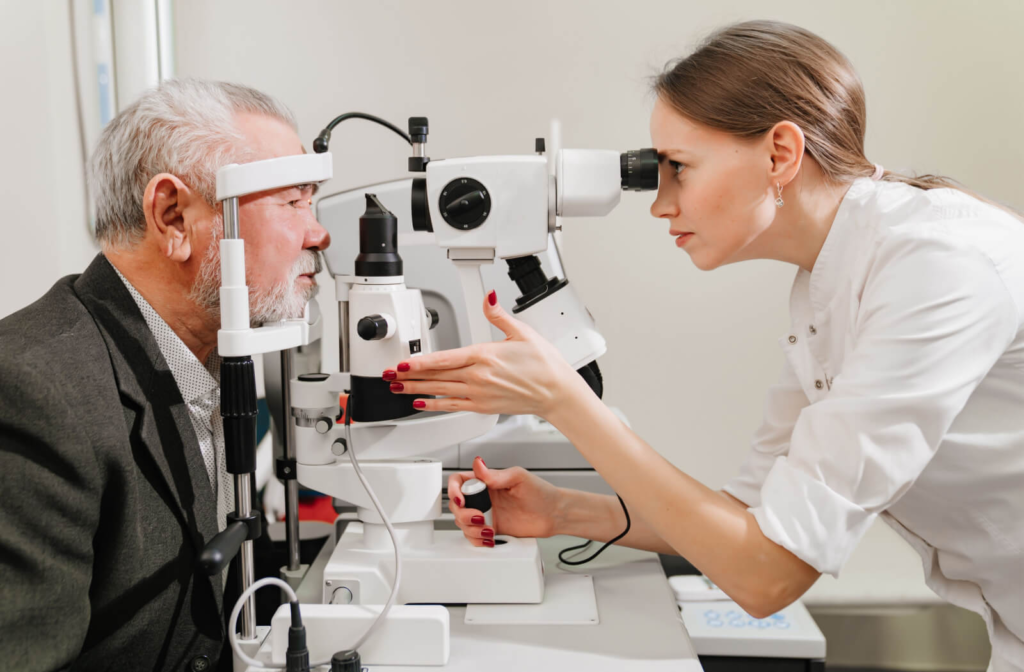Cataract surgery is a common procedure that many people undergo to help restore their vision. While the procedure is generally safe and effective, there are important considerations to keep in mind when it comes to driving after cataract surgery.
You should wait 2 weeks minimum before you start to drive again after cataract surgery, and even after 2 weeks, check in with your eye doctor so they can safely clear you to drive again.
If you suspect that you may have cataracts, it’s important to see an eye doctor for a comprehensive eye exam to determine the best course of treatment.
What Are Cataracts?
Cataracts are a common eye condition that affect many people as they age. They occur when the natural lens of the eye gets clouded, resulting in blurred or poor vision. Cataracts can form in one or both eyes and develop slowly or quickly.
There are several factors that can contribute to the development of cataracts, including:
- Age
- Genetics
- Underlying health conditions like diabetes
Symptoms of cataracts can include:
- Cloudy or blurry vision
- Difficulty seeing at night
- Sensitivity to bright light
- Seeing halos around lights
What Is Cataract Surgery?
Cataract surgery is a procedure that removes the clouded lens of the eye that has been damaged by cataracts.
During cataract surgery, the cloudy lens is removed and replaced with an artificial lens, known as an intraocular lens (IOL). There are 2 main types of cataract surgery:
- Phacoemulsification
- Extracapsular surgery
Phacoemulsification
The most common form of cataract surgery is phacoemulsification, which involves using ultrasonic waves to break up the cloudy lens and remove it through a small incision.
Extracapsular
Extracapsular surgery entails removing the clouded lens in a single piece via a bigger incision.
Both types of surgery are generally safe and effective, and most patients can return to their normal activities within a few weeks. It’s important to follow your doctor’s post-operative care instructions to ensure a full recovery.
In 2023, extracapsular cataract surgery is rarely performed as phacoemulsification provides considerably more accurate results and better safety of the two types of surgeries.

After Cataract Surgery
Following cataract surgery, your doctor will advise you on how soon you can return to your regular daily activities. It’s important to avoid any activities after your surgery that may strain your eyes, including driving. At Vector Eye Centre, we advise not to drive for at least 2 weeks after your initial eye’s cataract surgery.
Depending on the type of IOL that is selected by the patient for implantation during cataract surgery, driving may be possible 1 week after the 2nd eye’s surgery, but this would need to be cleared with your Ophthalmologist.
Immediately After Surgery
Immediately after cataract surgery, make sure you rest and let your eyes recover. It’s normal to experience some blurriness and discomfort in the first few days after surgery, and your doctor will prescribe eye drops or other medications to help with the healing process.
In Alberta’s climate, it is very common to experience dryness and ocular surface inflammation within the first 2 weeks or recovery. Ensure you rest and recover exactly as advised, and use the postoperative topical medications as prescribed. This will help you to obtain your best vision as quickly as possible and long-term.
The Weeks After Surgery
You will have a follow-up appointment with your doctor one day following surgery, and again at around 2 weeks following surgery to check on your progress. At this time, your doctor will be able to tell you when you can resume driving. Again, this depends on the intraocular lens that you selected to be in your eye at the time of surgery.
As mentioned, most people can resume driving after 2 weeks post-surgery, provided their eyesight has improved enough, meets legal driving requirements, and they feel safe behind the wheel.
Everyone’s healing process is unique, and some people may need to wait more than 2 weeks before they may resume driving. Your doctor can provide you with tailored recommendations depending on your situation.
Factors That May Affect When You Can Drive
Several factors can influence when you can resume driving following cataract surgery. Some examples include:
- The type of surgery you had: Different types of cataract surgery can have different recovery times, so it’s important to follow your doctor’s advice regarding when you can resume driving.
- The type of intraocular lens you selected: Some intraocular lenses (IOLs) help decrease the need for glasses after cataract surgery. Toric, extended vision (EDOF), bifocal and multifocal IOLs can all help improve your distance vision to the point where glasses are no longer needed to drive. With these IOLs, you can likely drive sooner after cataract surgery. However, 2 weeks off is still recommended after your first eye’s surgery regardless of the IOL selected for safety, to stave off dryness, and to allow you the time required to appropriately adapt to your new vision.
- Age and general health: Older people and those with pre-existing medical conditions might need extra time to recover following surgery.
- Your other eye’s vision: If you have good vision in your other eye, you may be able to drive sooner than someone who relies more heavily on the eye that had surgery.
Tips for Driving After Cataract Surgery
If your doctor has cleared you to drive again following cataract surgery, there are a few things you should keep in mind to support a safe and effective recovery:
- Take it slow: Ease back into driving slowly and safely, especially if you haven’t driven in a few weeks.
- Be alert of your surroundings: Your eyesight may still be fuzzy or distorted after surgery, so pay close attention to your surroundings.
- Ease into driving at night: Your vision may be more sensitive to light.
- Wear sunglasses: Sunglasses can shield your eyes from harsh sunlight and glare, which you may be more sensitive to following cataract surgery. Look for sunglasses with 100% UV protection and polarized lenses to prevent glare.
Cataract Surgery at Vector Eye Centre
Cataract surgery is a wonderful tool to improve your eyesight and quality of life, but it’s also vital to take proper care of your eyes afterward.
While it may be tempting to resume your daily activities as soon as possible, including driving, it’s important to follow your doctor’s recommendations and give your eyes the time they need to recuperate.If you’re unsure when you can resume driving following cataract surgery, or if you have any other concerns about your aftercare, call us at Vector Eye Centre.



